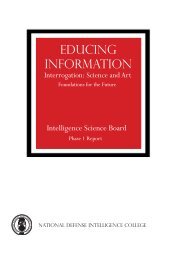COURTING A RELUCTANT ALLY - National Intelligence University
COURTING A RELUCTANT ALLY - National Intelligence University
COURTING A RELUCTANT ALLY - National Intelligence University
- No tags were found...
Create successful ePaper yourself
Turn your PDF publications into a flip-book with our unique Google optimized e-Paper software.
PROLOGUESince World War II, the United States and the United Kingdom have mutuallybenefited from an unprecedented “special relationship” with regard to intelligencesharing and cooperation. What were the origins of that relationship and what lessonscan be derived from its development? While it may seem obvious that thecommon Axis threat drove both countries to increased levels of intelligence sharing,the extent of the cooperation eventually attained would have surprised manyon both sides of the Atlantic prior to World War II. Despite a brief period as alliesduring World War I, the U.S. and the UK quickly reverted to their traditional rolesas strategic competitors following the conclusion of the Great War. A highly visibleaspect of that competition was in the area of naval forces, in which both countriesinvested considerable diplomatic, economic, and military resources.Notwithstanding this rivalry, their naval intelligence cooperation during WorldWar II is often cited as one of the most successful in history. How did this “specialrelationship” develop, given the contentiousness that existed between these twocountries in the interwar period? An analysis of this period indicates one significantfactor was the aggressive pursuit of naval intelligence cooperation by theBritish as part of their larger strategy to secure U.S. entry into the war. The tacticsthe British employed to secure this cooperation are of interest, as history hasshown the British were able to overcome significant distrust on the part of Americanofficials, who were extremely wary of British intentions.Like the UK, the U.S. is interested in developing intelligence cooperationarrangements with states, such as Russia and India, with whom our country hashad inimical or competitive relationships. 1 An assessment of the UK’s overallstrategy for establishing a closer intelligence relationship with the U.S. can yieldinsights into effective strategies the U.S. could use to enhance intelligence cooperationwith countries that have had, or continue to have, competitive relations withthe United States. Second, an analysis of this subject is of historical importance tothe <strong>Intelligence</strong> Community (IC) since the intelligence-sharing agreementsbetween the U.S., the UK, and its former dominions had their antecedents in theWorld War II period and it is important to understand the rationale behind their1 The White House, “Joint Statement Between U.S. and India,” 9 November 2001, The WhiteHouse, URL:, accessed16 November 2003; The White House, “Press Briefing by <strong>National</strong> Security Advisor Dr. CondoleezzaRice on the President’s Trip to Europe and Russia,” The White House, URL:, accessed 16 November 2003.ix
















